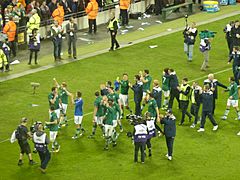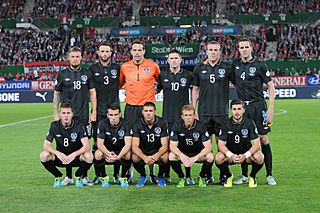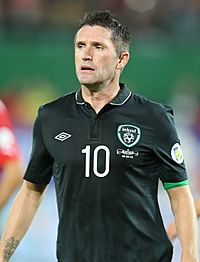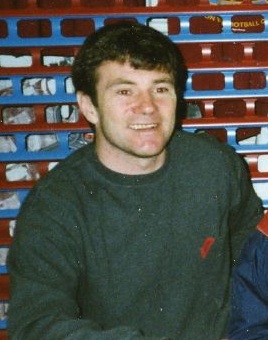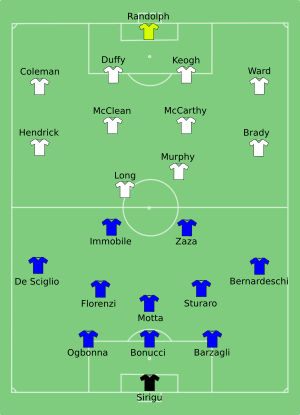Republic of Ireland national football team facts for kids
The Republic of Ireland Men's national football team (called Foireann peile náisiúnta Phoblacht na hÉireann in Irish) plays for the Republic of Ireland in international football matches. The team is managed by the Football Association of Ireland (FAI).
The team first played at the 1924 Summer Olympics, reaching the quarter-finals. Between 1924 and 1936, they were known as the Irish Free State. From then until 1950, the FAI called them Éire or Ireland. During this time, another team from Northern Ireland also played. In 1953, FIFA decided that the FAI team would be officially called the Republic of Ireland. The other team was named Northern Ireland. The Republic of Ireland was the first team from outside the United Kingdom to beat England at home in 1949. They reached the quarter-finals of the 1964 European Nations' Cup, losing to Spain.
Under manager Jack Charlton, the team had its most successful period. They reached their highest ever FIFA world ranking of sixth in August 1993. They qualified for UEFA Euro 1988, their first time at the UEFA European Championship. They also reached the quarter-finals of the 1990 FIFA World Cup and the last 16 at the 1994 World Cup. Jack Charlton's replacement, Mick McCarthy, led the team to the last 16 at the 2002 World Cup. Manager Martin O'Neill repeated this feat at Euro 2016.
The team's home stadium is the Aviva Stadium in Dublin. Their traditional colours are green shirts and white shorts. The current manager is Heimir Hallgrímsson. Séamus Coleman has been the team captain since 2016.
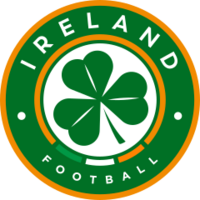 |
|||
| Nickname(s) | The Boys in Green (Irish: Na buachaillí i nglas) |
||
|---|---|---|---|
| Association | Football Association of Ireland (FAI) | ||
| Confederation | UEFA (Europe) | ||
| Head coach | Heimir Hallgrímsson | ||
| Captain | Séamus Coleman | ||
| Most caps | Robbie Keane (146) | ||
| Top scorer | Robbie Keane (68) | ||
| Home stadium | Aviva Stadium | ||
| FIFA code | IRL | ||
|
|||
| FIFA ranking | |||
| Current | 34 |
||
| Highest | 6 (August 1993) | ||
| Lowest | 70 (June–July 2014) | ||
| Elo ranking | |||
| Current | 43 |
||
| Highest | 8 (March–April 1991, April 2002, August 2002) | ||
| Lowest | 63 (May 1972) | ||
| First international | |||
(Colombes, France; 28 May 1924) |
|||
| Biggest win | |||
(Dublin, Ireland; 16 November 1983) |
|||
| Biggest defeat | |||
(Uberlândia, Brazil; 27 May 1982) |
|||
| World Cup | |||
| Appearances | 3 (first in 1990) | ||
| Best result | Quarter-finals (1990) | ||
| European Championship | |||
| Appearances | 3 (first in 1988) | ||
| Best result | Round of 16 (2016) | ||
Contents
Team History and Key Moments
Early Years: 1920s to 1980s
Before 1924, one football team represented all of Ireland. After Ireland was divided in 1920, a new group called the Football Association of the Irish Free State (FAIFS) was formed in Dublin. They started their own league and national team.
In 1923, FIFA recognized the FAIFS. The Irish Free State team played its first international match at the 1924 Summer Olympics. On May 28, they beat Bulgaria 1–0, with Paddy Duncan scoring the first goal. They reached the quarter-finals but lost to the Netherlands.
On June 14, 1924, the team played its first home game against the United States at Dalymount Park. Ed Brookes scored three goals in a 3–1 win. In 1934, the Irish Free State played its first FIFA World Cup qualifier, drawing 4–4 with Belgium. Paddy Moore scored all four goals, becoming the first player to do so in a World Cup game.
After 1936, the team became known as the Football Association of Ireland (FAI) and called their team Éire or "Ireland." For a while, two Irish teams existed, both claiming to represent the whole island. FIFA stepped in and decided that the FAI team would be called the Republic of Ireland for major tournaments.
A big moment came on September 21, 1949, when the Republic of Ireland beat England 2–0 at Goodison Park. This was the first time England lost at home to a team from outside the UK.
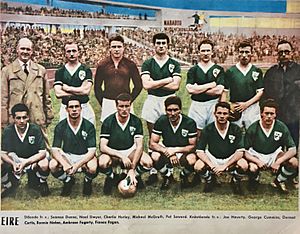
In 1965, Shay Brennan, born outside Ireland but with an Irish parent, was chosen to play for the team. This opened the door for many players born in England or Scotland with Irish family to represent the Republic of Ireland.
The team had several managers in the 1970s and 80s, including Mick Meagan, Liam Tuohy, and Johnny Giles. They improved, but still struggled to qualify for big tournaments.
The Golden Era: 1986–1995
In 1986, Jack Charlton, an English manager who won the World Cup with England in 1966, took charge. He led the Republic of Ireland to its most successful period. They qualified for two World Cups and one European Championship. Key players during this time included Paul McGrath, Packie Bonner, Niall Quinn, Ray Houghton, John Aldridge, and Ronnie Whelan.
Ireland's first major tournament was UEFA Euro 1988. They surprised everyone by beating England 1–0 with a goal from Ray Houghton. They drew 1–1 with the Soviet Union and narrowly lost 1–0 to the Netherlands.
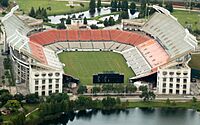
The team then qualified for the 1990 FIFA World Cup in Italy. They drew all three group games against England, Egypt, and the Netherlands. This was enough to reach the knockout stage. They famously beat Romania on penalties, with Packie Bonner making a key save and David O'Leary scoring the winning penalty. Ireland then lost 1–0 to host nation Italy in the quarter-finals.
After missing out on Euro 1992, Ireland qualified for the 1994 FIFA World Cup in the United States. They started with a 1–0 win against Italy, with Ray Houghton scoring. They lost to Mexico and drew with Norway, but still made it to the second round. There, they lost 2–0 to the Netherlands.
Jack Charlton's last game as manager was a play-off match for Euro 1996, where Ireland lost 2–0 to the Netherlands.
After the Golden Era: 1996–2007
Mick McCarthy took over as manager. Ireland missed out on the 1998 World Cup after losing a play-off to Belgium. They also missed Euro 2000, losing a play-off to Turkey on the away goals rule.
Ireland qualified for the 2002 FIFA World Cup. Before the tournament, there was a big disagreement between captain Roy Keane and manager Mick McCarthy, and Keane was sent home. Despite this, Ireland drew with Cameroon and Germany, and beat Saudi Arabia 3–0 to reach the knockout stage. They lost to Spain on penalties after a 1–1 draw.
After a poor start to Euro 2004 qualifiers, McCarthy was replaced by Brian Kerr. Kerr also struggled to qualify the team for major tournaments and was sacked in 2005. Steve Staunton became manager in 2006, but the team failed to qualify for Euro 2008, including a tough 5–2 loss to Cyprus. Staunton left in 2007.
Recent Years: 2008–Present
Giovanni Trapattoni became manager in 2008. Ireland went unbeaten in their 2010 World Cup qualifying group. However, they lost a controversial play-off to France. Thierry Henry handled the ball before setting up a goal, which the referee missed, leading to France winning.
In 2011, Ireland won the first Nations Cup, beating Wales, Northern Ireland, and Scotland without letting in a goal. They qualified for UEFA Euro 2012 by beating Estonia in a play-off. At the tournament, they lost all three group matches. However, UEFA gave a special award to the Irish fans for their amazing support, even when the team was losing.
Ireland did not qualify for the 2014 World Cup, and Trapattoni resigned. Martin O'Neill took over as manager in 2013, with Roy Keane as his assistant.
For UEFA Euro 2016 qualification, Ireland beat world champions Germany 1–0 at the Aviva Stadium, with Shane Long scoring. This helped them reach the play-offs, where they beat Bosnia and Herzegovina 3–1 on aggregate to qualify for Euro 2016.
At Euro 2016, Ireland drew 1–1 with Sweden and lost 3–0 to Belgium. In their final group game, Robbie Brady scored a late goal to beat Italy 1–0, sending Ireland to the knockout stage for the first time in a European Championship. They faced hosts France in the Round of 16, taking an early lead, but eventually lost 2–1.
Ireland reached the play-offs for the 2018 FIFA World Cup after beating Wales 1–0. However, they lost 5–1 on aggregate to Denmark in the play-offs.
In 2018, Martin O'Neill and Roy Keane left their roles. Mick McCarthy returned as manager. Ireland failed to automatically qualify for Euro 2020 and lost a play-off semi-final to Slovakia on penalties.
On April 4, 2020, Stephen Kenny became manager. Ireland did not qualify for the 2022 World Cup. In 2021, Chiedozie Ogbene became the first African-born player to play for the Republic of Ireland.
Ireland did not qualify for Euro 2024, finishing fourth in their group. In October 2023, it was confirmed that Ireland would co-host UEFA Euro 2028 with England, Scotland, Wales, and Northern Ireland. However, they will not automatically qualify and will need to play in the qualifiers.
Stephen Kenny's contract ended in November 2023. Heimir Hallgrímsson is the current head coach.
Team Kit and Home Stadium
Team Kits
Traditionally, the team wears green shirts, white shorts, and green socks for home games. The away kit is usually white shirts with green shorts and socks. In their first international match in 1924, they wore blue jerseys. In 2021, they wore a blue jersey again to celebrate the FAI's 100th birthday.
Different companies have supplied the kits over the years, including Umbro, New Balance, and currently Castore since 2023.
Home Stadiums
Since the 1980s, most home matches have been played at Lansdowne Road in Dublin. This stadium was rebuilt and reopened as the Aviva Stadium in 2010. The Aviva Stadium can hold 51,700 fans for competitive games. The first football match there was in August 2010.
While the Aviva Stadium was being built, the team played some home games at Croke Park, a large stadium in Dublin usually used for Gaelic games. Croke Park can hold about 74,500 fans for football matches.
Before the 1980s, most home games were played at Dalymount Park. The team has also played a few games in other stadiums around Ireland, including Tolka Park, the RDS Arena, Thomond Park in Limerick, and Turners Cross in Cork.
Player Selection and Nationality
Sometimes, players born in Northern Ireland who have Irish family choose to play for the Republic of Ireland team. This can be a sensitive topic, especially if they have played for Northern Ireland's youth teams. However, under the Good Friday Agreement, people born in Northern Ireland can choose Irish citizenship. FIFA rules allow these players to represent the Republic of Ireland unless they have already played a full competitive match for Northern Ireland.
Recent Matches and Future Games
The team plays matches in various competitions, including the UEFA Nations League and qualifiers for the FIFA World Cup and UEFA European Championship.
2024 Matches
| 7 September 2024 2024–25 UEFA Nations League B Group 2 | Republic of Ireland |
0–2 | Dublin, Ireland | |
| 17:00 UTC+1 | Stadium: Aviva Stadium Attendance: 50,359 Referee: José María Sánchez (Spain) |
| 10 September 2024 2024–25 UEFA Nations League B Group 2 | Republic of Ireland |
0–2 | Dublin, Ireland | |
| 19:45 UTC+1 | Ioannidis Tzolis |
Stadium: Aviva Stadium Attendance: 37,274 Referee: Espen Eskås (Norway) |
| 10 October 2024 2024–25 UEFA Nations League B Group 2 | Finland |
1–2 | Helsinki, Finland | |
| 21:45 UTC+3 | Pohjanpalo |
Scales Brady |
Stadium: Helsinki Olympic Stadium Attendance: 16,105 Referee: Aleksandar Stavrev (North Macedonia) |
| 13 October 2024 2024–25 UEFA Nations League B Group 2 | Greece |
2–0 | Piraeus, Greece | |
| 21:45 UTC+3 | Bakasetas Mantalos |
Stadium: Karaiskakis Stadium Attendance: 30,253 Referee: Joey Kooij (Netherlands) |
| 14 November 2024 2024–25 UEFA Nations League B Group 2 | Republic of Ireland |
1–0 | Dublin, Ireland | |
| 19:45 UTC±0 | Ferguson |
Pohjanpalo |
Stadium: Aviva Stadium Attendance: 39,163 Referee: Harm Osmers (Germany) |
| 17 November 2024 2024–25 UEFA Nations League B Group 2 | England |
5–0 | London, England | |
| 17:00 UTC±0 | Stadium: Wembley Stadium Attendance: 79,969 Referee: Erik Lambrechts (Belgium) |
2025 Matches
| 20 March 2025 UEFA Nations League relegation playoff | Bulgaria |
1–2 | Plovdiv, Bulgaria | |
| 21:45 UTC+2 | Petkov |
Azaz Doherty |
Stadium: Stadion Hristo Botev Attendance: 7,835 Referee: Benoît Bastien (France) |
| 23 March 2025 UEFA Nations League relegation playoff | Republic of Ireland |
2–1 (4–2 agg.) |
Dublin, Ireland | |
| 19:45 UTC±0 | Ferguson Idah |
Antov |
Stadium: Aviva Stadium Attendance: 40,156 Referee: Halil Umut Meler (Turkey) |
| 6 June 2025 Friendly | Republic of Ireland |
1–1 | Dublin, Ireland | |
| 19:45 UTC+1 | McAteer |
Sarr |
Stadium: Aviva Stadium Attendance: 32,478 Referee: Adam Ladebäck (Sweden) |
| 10 June 2025 Friendly | Luxembourg |
0–0 | Luxembourg City, Luxembourg | |
| 20:45 UTC+1 | Stadium: Stade de Luxembourg Attendance: 6,312 Referee: Stefan Ebner (Austria) |
| 6 September 2025 2026 FIFA World Cup qualification | Republic of Ireland |
v | Dublin, Ireland | |
| 19:45 UTC+1 | Stadium: Aviva Stadium |
| 9 September 2025 2026 FIFA World Cup qualification | Armenia |
v | Yerevan, Armenia | |
| 20:00 UTC+4 | Stadium: Vazgen Sargsyan Republican Stadium |
| 11 October 2025 2026 FIFA World Cup qualification | Portugal |
v | Lisbon, Portugal | |
| 19:45 UTC+1 | Stadium: Estádio José Alvalade |
| 14 October 2025 2026 FIFA World Cup qualification | Republic of Ireland |
v | Dublin, Ireland | |
| 19:45 UTC+1 | Stadium: Aviva Stadium |
| 13 November 2025 2026 FIFA World Cup qualification | Republic of Ireland |
v | Dublin, Ireland | |
| 19:45 UTC±0 | Stadium: Aviva Stadium |
| 16 November 2025 2026 FIFA World Cup qualification | Hungary |
v | Budapest, Hungary | |
| 15:00 UTC+1 | Stadium: Puskás Aréna |
Coaching Staff
The current coaching team for the senior men's national side includes:
| Position | Name |
|---|---|
| Head Coach | |
| Assistant Head Coach | |
| Goalkeeping coach |
Player Records
These are some of the top players for Ireland based on how many games they played (caps) and how many goals they scored. Players in bold are still playing for Ireland.
Most Games Played (Caps)
| Rank | Player | Caps | Goals | Career |
|---|---|---|---|---|
| 1 | Robbie Keane | 146 | 68 | 1998–2016 |
| 2 | Shay Given | 134 | 0 | 1996–2016 |
| 3 | John O'Shea | 118 | 3 | 2001–2018 |
| 4 | Kevin Kilbane | 110 | 8 | 1997–2011 |
| 5 | James McClean | 103 | 11 | 2012–2023 |
| 6 | Steve Staunton | 102 | 7 | 1988–2002 |
| 7 | Damien Duff | 100 | 8 | 1998–2012 |
| 8 | Aiden McGeady | 93 | 5 | 2004–2017 |
| 9 | Niall Quinn | 91 | 21 | 1986–2002 |
| Glenn Whelan | 91 | 2 | 2008–2019 |
Most Goals Scored
| Rank | Player | Goals | Caps | Average | Career |
|---|---|---|---|---|---|
| 1 | Robbie Keane (list) | 68 | 146 | 0.47 | 1998–2016 |
| 2 | Niall Quinn | 21 | 91 | 0.23 | 1986–2002 |
| 3 | Frank Stapleton | 20 | 71 | 0.28 | 1977–1990 |
| 4 | Don Givens | 19 | 56 | 0.34 | 1969–1981 |
| John Aldridge | 19 | 69 | 0.28 | 1986–1997 | |
| Tony Cascarino | 19 | 88 | 0.22 | 1985–2000 | |
| 7 | Shane Long | 17 | 88 | 0.20 | 2007–2021 |
| 8 | Noel Cantwell | 14 | 36 | 0.39 | 1953–1967 |
| Jonathan Walters | 14 | 54 | 0.26 | 2010–2018 | |
| Kevin Doyle | 14 | 63 | 0.22 | 2006–2017 |
Tournament Records
FIFA World Cup History
Ireland has played in the FIFA World Cup three times.
- 1990 World Cup: This was Ireland's first time at the World Cup. They drew all their group games and then beat Romania on penalties to reach the quarter-finals. They lost 1–0 to host nation Italy.
- 1994 World Cup: Ireland beat Italy 1–0 in their first game, a famous victory. They made it to the second round but lost to the Netherlands.
- 2002 World Cup: Despite some challenges, Ireland drew with Cameroon and Germany, and beat Saudi Arabia to reach the knockout stage. They lost to Spain on penalties.
Ireland has also had some close calls in qualifying, like in 2010 when a controversial handball by Thierry Henry helped France beat them in a play-off.
UEFA European Championship History
Ireland has played in the UEFA European Championship three times.
- 1988 European Championship: This was Ireland's first European Championship. They famously beat England 1–0, drew with the Soviet Union, and narrowly lost to the Netherlands.
- 2012 European Championship: Ireland qualified but lost all three of their group matches. However, their fans were praised for their amazing support.
- 2016 European Championship: Ireland drew with Sweden, lost to Belgium, and then beat Italy 1–0 with a late goal to reach the Round of 16. They lost to hosts France in a close game.
Honours and Awards
Regional Competitions
- Celtic Nations Cup
- Winners (1): 2011
Friendly Tournaments
- Iceland Triangular Tournament
- Winners (1): 1986
Special Awards
- FIFA Fair Play Award: 1997 (for their fans' excellent behaviour)
More About Irish Football
- Republic of Ireland women's national football team
- Republic of Ireland national under-21 football team
See also
 In Spanish: Selección de fútbol de Irlanda para niños
In Spanish: Selección de fútbol de Irlanda para niños


